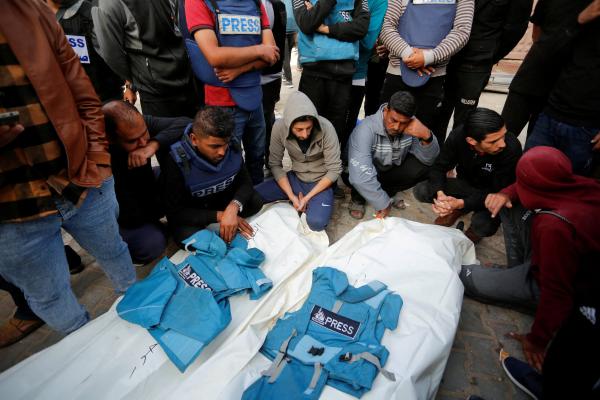It is the norm for Western media outlets to silence and ignore the voices of Palestinians. Israel set up a blockade against Gaza beginning in 2007 in response to Hamas’ taking over the territory. By restricting the movement of goods and people in and out of the territory, Israel has created a humanitarian crisis in Gaza. Israel has attempted to justify this blockade and the ensuing humanitarian crisis by characterizing Gazans specifically, and Palestinians in general, as “terrorists” — a characterization of Palestinians that is also prevalent in the United States. And as reported by Kathryn Post and Roxanne Stone for Religion News Service, negative U.S. media portrayals of Palestinians are reminding some Palestinians of the anti-Muslim and anti-Arab climate after 9/11.
In the days following the Oct. 7 terrorist attacks carried out by Hamas, U.S. media outlets and politicians quickly and rightly condemned these attacks. But Israel’s disproportionate response — the endless bombardment of Gaza and especially Israel’s occupation of the Palestinian territories — has received little condemnation or coverage. In fact, despite the massive Palestinian death toll and humanitarian organizations calling for a cease-fire, U.S. Secretary of State Anthony Blinken has openly opposed calls for a ceasefire in Gaza.
Where the U.S. media has failed in reporting on Israel’s occupation of Palestine and the humanitarian crisis facing those in the occupied territories, Palestinian-based journalists are offering a much-needed corrective. Christians should be especially interested in these perspectives as they center marginalized voices and reject the dominant narrative of the American empire.
Journalists like Motaz Azaiza, Plestia Alaqad, and Bisan Owda, three Palestinian journalists based in Gaza, have reported on Israel’s constant bombardment of Gaza and the more than 10,000 Palestinian casualties, of which more than 4,000 have been children. It is not an exaggeration to say that they are risking their lives. In May of 2022, American-Palestinian journalist Shireen Abu Akleh was reporting from Jenin camp when she was shot and killed by an Israeli soldier.
Thanks to the courage and tenacity of Palestinian journalists, the world has a window into the mountains of rubble that currently is Gaza. It’s likely that the world would have no clue about the sheer violence unleashed on Gaza without these journalists’ reporting because Israel will not allow international journalists to report without first vetting their material.
Not only should Christians be suspicious of a government attempting to censor the truth, but they should also be suspicious of governments that label entire groups of people as “terrorists.” Of course, for Christians, it’s important to keep in mind that Jesus was accused of inciting a political insurrection and labeled a terrorist by the Roman Empire (John 19:19-21).
Consider a recent statement made by Rep. Brian Mast (R.-Fla.) in defense of a bill he proposed that would severely limit humanitarian aid to Gaza: “I don’t think we would so lightly throw around the term ‘innocent Nazi civilians’ during World War II. …[T]here’s not this far stretch to say there are very few innocent Palestinian civilians.”
And it’s not just one politician demonizing Palestinians; a recent political cartoon published in The Washington Post further demonstrated anti-Palestinian and anti-Arab sentiments. (After backlash, the cartoon was removed.)
This messaging creates a bias that can then lead to violence. Consider the gruesome murder of 6-year-old Wadea Al-Fayoume from Plainfield, Ill. The 71-year-old man who murdered Wadea and attempted to kill his mother did so, in part, because the talk show radio he had been listening to made him afraid of Muslims and Palestinians. Again, the implied narrative in the American Empire about Palestinians is that they are criminals and terrorists.
In the Roman Empire, the dominant narrative about those condemned to be crucified was that they were criminals and terrorists. It’s easy to point to Jesus as the ultimate example of someone who was condemned to crucifixion even though he was innocent. But what’s interesting is that when Jesus is being crucified, he shows care and concern for the ones being crucified with him. Jesus ignores the empire’s labels and invites a “criminal” into the coming kingdom (Luke 23:32-43).
Whether it is the Roman Empire or the American Empire, empires are obsessed with labeling oppressed people as “terrorists” or “criminals.” In this time and place, the empire is telling us that our Palestinian siblings are “terrorists” and “criminals.”
But the Spirit is calling us to walk away — to resist — our empire’s call to blind support for one side. The Spirit is calling us to do the work of hearing the voices silenced by empires that have their treasures stored up in weaponry, war, and the gods of safety and security. After all, it is the gods of safety and security, or the false promises that they offer, that demand the blood of others.
As Christians, we follow in Jesus’ footsteps to hear the voices of the overlooked, the silenced, and those stripped of power. Therefore, it is our call to listen to the voices of our Palestinian siblings and to mourn the dead in Gaza to see our Palestinian siblings as no less worthy of tears, care, and concern. We can do this while we condemn terror and tend to the antisemitism within our own tradition. We can and must do both. May we hear and lift up the voices of the silenced and mourn their dead. In doing so, it is the gospel, not the empire, that dictates our values. In this time and place, that means looking beneath the rubble and focusing on the stories of Palestinians.
Got something to say about what you're reading? We value your feedback!







